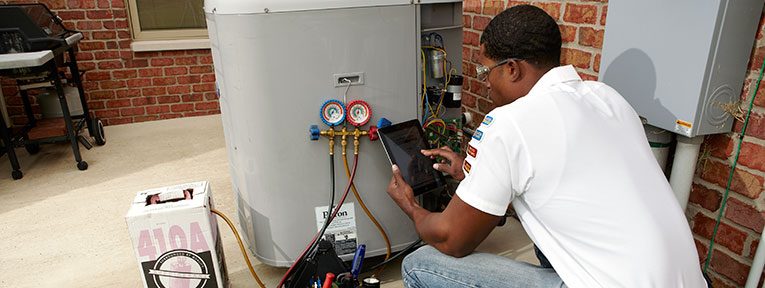
Comparing Refrigerants Side-by-Side
As a homeowner considering an HVAC purchase, it’s important that you understand the difference so you can make the best decision for your system. We’ve outlined below the main differences and why they matter.
R-22
- Often referred to by a brand name like Freon®
- As of 2010, R-22 was discontinued for use in new air conditioning systems
- R-22 is a hydro-chlorofluorocarbon (HCFC) which contributes to ozone depletion
R-410A
- Often referred to by a brand name like Puron®
- R-410A will be discontinued in new, residential air conditioners beginning Jan. 1, 2026. New R-410A systems can still be installed through Dec. 31, 2025.
- R-410A is being phased down and replaced by low GWP refrigerants (A2Ls).
A2L Refrigerants
- The HFC phasedown is being driven by the American Innovation and Manufacturing (AIM) Act, which has authorized the Environmental Protection Agency (EPA) to regulate the supply and demand of HFC refrigerants.
- A2L refrigerants are characterized by mild flammability, low toxicity, and low GWP. They include hydrofluoroolefins (HFOs) and HFO blends.
- Low GWP refrigerants, R-32 (675 GWP) and R-454B (466 GWP) for air conditioning, have been introduced.
- New equipment and systems using low-GWP refrigerants will be introduced in 2024.
What does this mean to homeowners?
During 2024 and 2025, homeowners looking to replace their AC or heat pump (currently using R-410A) or needing a full system replacement can still replace their unit with R-410A systems (based on availability). More than likely, this will be a lower cost than the new A2L systems. However, R-410A refrigerant production will continue to be phased down. There will be a major cut in HFC refrigerant production / import – 40% in 2024 and 70% beginning in 2029 (potentially driving R-410A prices up). Limited availability of R-410A will impact service costs (units requiring refrigerant) in the future.
If you’re looking for a full system replacement you can request a quote for one of the new A2L systems. The low global warming potential systems are more environmentally friendly and have a reduced impact on climate change versus previous refrigerants.
As always, consider potential rebates from your utility company or federal tax credits that are available for selecting higher efficiency systems. You can learn more at www.desireusa.org and www.energy.gov/save/rebates.
Related Articles
HVAC Glossary of Terms


